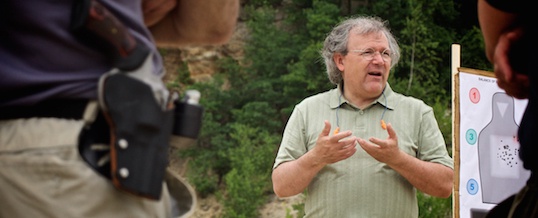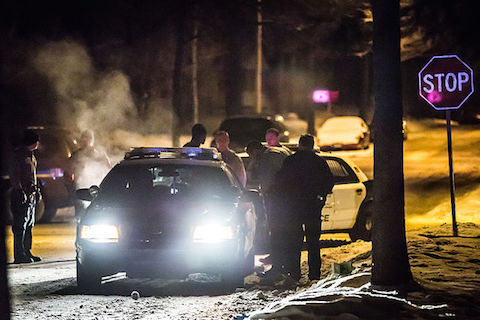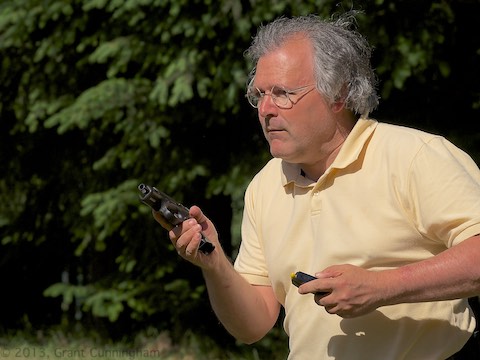
More questions you should ask your defensive shooting instructor – and why.
I recently received a note asking about questions to pose to potential instructors, questions that would tell a prospective student whether a shooting instructor (and their material) was worth consideration. That process is called “vetting” an instructor: assessing his or her background and suitability. It’s incredibly important for prospective students to do, yet there’s no easy way to do it.
Because of that, most people fall back on the instructor’s resumé: what shooting courses he’s attended, what military or law enforcement positions he’s held, and so on. The trouble is that those things don’t tell you anything about him as a teacher: does he comprehend the context of your needs, the situations you’ll likely face and the environment — including the legal environment — you live in? Does he understand plausibility, the suitability of the skills in relation to actual need? Most importantly, can he teach — can he explain concepts in a clear and concise manner? Can he use language competently so that you gain a clear understanding of his curriculum? Is he capable of helping you develop a skill through explanation? Can he logically support the reason for a skill’s inclusion in his program, as well as its execution and application?
Finally, is he committed to continually advancing those abilities to teach plausible, contextual material?
These are all things that are vital to your success in a class, and more importantly to your ability to be able to defend yourself (with or without a firearm.) What shooting courses he’s taken and what jobs he’s had are really secondary to the goal of increasing your knowledge and skill level. In fact, they may be the least important of all the traits of the “perfect” defensive shooting instructor.
The problem is that the traits of a good instructor which are important are nearly impossible to discern through a resumé. They’re hard to relate in print and easily overshadowed by the more flashy, exciting stuff (like what uniform he wore or what medals he’s earned) that has very little to do with how you live your life.
Earlier this year I wrote an article on this very topic, suggesting two questions you should ask a prospective instructor. In it I talk about biases and preconceptions and about the inevitability of change if an instructor really is growing and progressing. Naturally I referred this fellow to that article, but then realized that something was missing.
That something is a question to determine where an instructor’s priorities are: becoming a better shooter himself, or helping you to become a better defensive shooter. Remember: your skill development — appropriate skill development — is the only thing that’s important. How can you establish whether your instructor understands that?
The question I suggested is this: “what instructor development course have you taken in the last year that did NOT involve pulling a trigger?” That’s a bombshell. If I asked any ten established instructors that question, at least nine of them would dive into a tirade and exclaim that how well they shoot determines how well their students will learn. It looks silly when written out, but lots of people in this business truly believe that.
Learning how to teach is, in fact, the most important thing your instructor can possibly do for you. Yes, for *you*. Being able to teach, understanding how learning occurs in the brain and how to facilitate that biochemical process, is vital to helping students achieve their goals. Yet, surprisingly, this part of instructor development is glossed over in our business; what little covered in shooting instructor courses is usually out of date, taught by people who aren’t degreed educational experts — and who likely weren’t themselves taught by such experts.
Now I’m not saying it takes someone with a PhD in Educational Psychology to do a good job of teaching, but if someone doesn’t have that background he (or she) is going to have to dedicate some time to gaining that knowledge in the post-college world. That is, if they’re really conscientious about the job they want you to pay them for! It’s going to require courses in learning and teaching, courses with up-to-date material from experts in the educational field, and perhaps even delving into related fields (like, say, neuroscience) for a more complete understanding of the process — all of which brings us right back to the question I proposed.
If someone can’t tell you what they’ve done to become a better teacher in the last year or two, activities that were devoted solely to the art and science of teaching, then are the specifics of what they’re teaching all that important? In reality, there are only so many ways to shoot a gun; there are a few variations on that topic, but realistically — and with very few exceptions — pretty much everyone in this business agrees on at least 90% of the stuff that everyone else teaches. The remaining 10% may be slightly different in terms of plausibility and efficiency, but I’d say in many cases it’s almost immaterial.
What isn’t immaterial is how the 90% is transmitted to you. If it’s not done well, if it’s not done in a manner that helps you gain both greater understanding and physical competency, does it really matter what the 10% that differentiates your instructor from the next is? I’d say no.
If you really want to vet your defensive shooting instructor, ask him or her this question and the two in the linked article. Expect actual answers, and watch for evasion and equivocation. Press for the answers you really need; if they can’t formulate responses to tough questions now, how are they ever going to do so in class?
— Grant Cunningham
- Posted by Grant Cunningham
- On August 25, 2015



